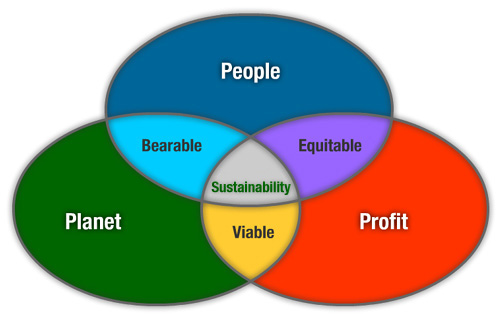
The Three “P’s ” of The Triple Bottom Line
Here at AnswerConnect, we believe businesses are responsible for more than just making money. People and Planet are equally as important as Profit as a measure of success as a business. That’s why we adhere to what’s known as the Triple Bottom Line.
Never heard of the triple bottom line concept? Let’s look at some examples of the triple bottom line, and how it affects you, your business and the planet.
Embrace the triple bottom line to grow
Companies that follow the triple bottom line concept of doing business consider the impact their actions have on everyone associated with them.
That includes everyone from:
- The suppliers who provide raw materials to your business.
- The intermediaries involved in selling and distributing your products and services.
- The CEO, managers and team leaders who define the structure of your organisation.
These companies offer:
- Health care plans.
- Good working hours.
- A healthy, safe place to work.
- Opportunities for progression and education.
- A work environment free of exploitation.
In some cases, the “social” bottom line also includes the community where the company is based.
In 1994 John Elkington coined the phrase “The Triple Bottom Line”.
- Economy – Profit, growth, revenue and cost.
- Social – People, employee welfare, fair trade and charitable contributions.
- Environment – Planet, resource consumption, land use and waste management.
Profit
All of which make up the sustainability of a company. Every business needs to make a profit. Economic growth – a significant factor in social wellbeing – relies on continued, sustainable growth.
For businesses, there are several indirect cost savings to adopting sustainable work practices. Chief among these is the move to a flexible working model. Stanford University conducted a study of 500 people who worked both remotely and in a traditional setting. The research found that home-based workers enjoyed a full day’s worth of increased productivity over their office counterparts. That added productivity translates to better performance and greater gains for the business.
A sustainable business policy is essential to the survival of the planet, but it can also have a profound impact on the survival of your company. In the UK, for example, the decline of the steel and coal industries was envisaged long before it began. Yet many companies struggled to adapt.
Thousands of people lost their livelihoods. Whole communities – including local businesses – were hit by the fallout. The effects are still felt in communities across the UK. But this short-sighted approach to business is only just being questioned.
People
It’s also vital that businesses develop policies to create an ethical and responsible social code. With a robust social code – including the ethical sourcing of materials, the equitable treatment of employees and a commitment to invest back into the local community through education and social programs – organisations can create a harmonious cycle of reciprocal growth.
Just as importantly, however, is the impact on employee happiness. A 2019 study by Citrix found that “73% of current remote workers report that flexible working improves personal wellbeing and the ability to balance work with outside activities.”
Planet
With modern government initiatives designed to incentivise waste and pollution reduction, it also makes sound fiscal sense to shift to the triple bottom line model. The UK offers a number of tax incentives to companies that adopt sustainable working practices.
Adding green features – including energy-efficient heating and lighting for your office, paperless processes, and carpool schemes can all net organisations’ savings. Of course, distributed work – where employees can work from anywhere without the burden of a daily commute – is another highly effective policy. Not only does it save employees time and money on travel – but it also cuts your team’s collective carbon output.
And this shift couldn’t come a moment too soon. A recent UN report stated that “To stay within relatively safe limits, emissions must decline sharply, by 7.6% every year, between 2020 and 2030.”
Trust the process
As more companies embrace the triple bottom line concept, there is a chance to redefine the purpose of business in society. More importantly, it’s an opportunity to build robust business models that respond to the needs of everyone rather than a select few. The three values are mutually dependent on each other – and can be mutually beneficial. To create a truly sustainable company – you have to put your faith in all three.
There are so many ways we can help, and with just a little research we can improve the triple bottom line for your company. For AnswerConnect, our mission to help businesses is also entwined with our mission to help people and the planet.
Working with 1 Tree 1 Planet, we plant a tree for every customer and every employee every month. Around 15 billion trees are cut down annually. But trees are the lungs of our planet, and trees are also essential to absorb excess CO2 from the atmosphere.
Through this initiative (coupled with a move to working anywhere and cutting the commute), we can offset carbon emissions levels and build a brighter future for people and the planet.
Call AnswerConnect at 0800 802 1609 or register here today to ensure your clients are greeted by capable, responsive professionals 24/7/365.
Quick takeaways.
- Here at AnswerConnect, we believe businesses are responsible for more than just making money. People and Planet are equally as important as Profit as a measure of success as a business.
- As more companies embrace the triple bottom line concept, there is a chance to redefine the purpose of business in society.
- At AnswerConnect, our mission to help businesses is also entwined with our mission to help people and the planet.
This article was originally developed by Gerry McColl. It was updated on 30.01.2020 by Ben Graham


